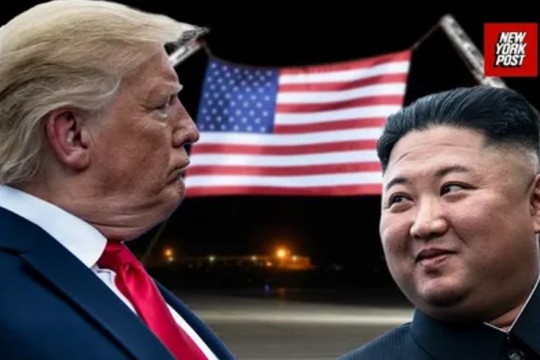Trump and Kim
One day after 14 American 30,000-pound bombs thundered down on Iran, North Korea’s Foreign Ministry issued a typically florid public statement through its state-run media, claiming the United States had “violently trampled down the territorial integrity and security interests of a sovereign state.”
Unlike North Korea, Iran doesn’t yet have a nuclear weapon. But for North Korea’s leader, Kim Jong-un, America’s airstrikes on Iran’s aspirational nuclear infrastructure must have reinforced what he has long held to be true: that possessing nuclear weapons is vital for his and his nation’s survival. Would the United States carry out such a brash, pre-emptive operation if Iran could credibly strike back with the bomb? – asks ‘The New York Times’.
This calculus has been at the forefront of Mr. Kim’s mind since taking power from his father more than a decade ago. Nothing has diverted him from driving North Korea’s military, industrial and science communities to develop nuclear weapons and long-range missiles that put targets on the United States and its allies.
And remarkably, he’s accomplished those tasks. Despite decades-long efforts by the United States and other world powers to persuade North Korea off the nuclear path, the small, isolated nation is estimated to have assembled around 50 warheads and produced enough fissile material for up to 40 more. Its arsenal of intercontinental ballistic missiles can very likely target every major U.S. city, and thousands of additional missiles are currently in range of U.S. military bases across the Asia-Pacific.
Unlike with Iran, President Trump is not threatening war to disarm North Korea. In fact, five months into his second term, he doesn’t seem to be paying much attention at all, even as Mr. Kim has grown stronger through new nuclear weapons, missiles and alliances.
Now that the flurry of military activity to neutralize Iran’s nuclear ambitions has died down, the intractable problem of North Korea’s program looms even larger. There are no outward signs that a similar mission is being considered.
Mr. Kim has repeatedly made it clear that he has no intention of giving up the program. But Republican and Democratic presidents alike have nevertheless spent a quarter-century seeking North Korea’s “complete, verifiable and irreversible denuclearization.” (In 2021, President Joe Biden invited talks with Pyongyang with no preconditions, but that offer went nowhere.) This year, Mr. Trump became the latest commander in chief to publicly commit to the unrealistic goal of getting Mr. Kim to abandon his program altogether.
America can no longer afford for its outdated denuclearization demands to be an obstacle to kick-starting diplomacy. Though Washington does not officially acknowledge North Korea as a nuclear weapons state, the U.S. military already plans and conducts drills based on the fact that North Korea has a nuclear arsenal. Mr. Trump, himself, has publicly said on at least three occasions that it is a nuclear power. Acknowledging this as a diplomatic fact is a difficult decision, to be sure, but it is also necessary to achieve a breakthrough that can reduce tensions, avert unwanted war and prevent hundreds of new weapons from entering North Korea’s ever-growing arsenal.
The Trump administration should draw up a diplomatic road map that would freeze North Korea’s fast-growing nuclear program in place in exchange for relief from the sanctions that have crippled the nation’s economy. The policy upheaval is almost certain to trigger backlash from South Korea and Japan, the U.S. allies most directly threatened by North Korea’s nuclear program, and stoke concerns among other nations for rewarding North Korea’s bad behavior. But a change in approach is necessary to begin managing the mounting risks.
Last June, Pyongyang signed a mutual defense pact with Russia. Analysts believe Moscow is already providing North Korea with hard-won expertise on missile technology, helping it improve manufacturing practices, produce lightweight composite materials and capture performance data from missiles used on the Ukrainian battlefield.
Three meetings between Mr. Trump and Mr. Kim in 2018 and 2019 — as the pair exchanged love letters — that many hoped would slow down North Korea’s nuclear program ended in disappointment due in large part to hasty planning and the United States’ continued insistence on denuclearization. Mr. Kim held back from missile tests in 2018 and launched just a handful in 2020 and 2021, but the pace picked back up in 2022. In the past few years, under the Biden administration, Pyongyang test-fired more missiles than ever before while also revealing an array of new weapons.
So what do we know about North Korea’s nuclear weapons program? We know that its nuclear program’s infrastructure is vast. We know its weapons work. We know its missiles work. Why wouldn’t the United States negotiate to obtain better insight and open communication channels to help shape Mr. Kim’s choices in a potential crisis?
The looming nuclear threat is now so severe that joint U.S.-South Korea exercises in April involved nuclear weapon effects scenarios. It’s wise that they do, considering U.S. intelligence says North Korea could use a nuclear weapon early in a conflict to make up for its deficit in conventional capabilities.
Mr. Trump should not allow the shackles of the past to hobble his administration when there are more sensible strategies available to shape a more promising future.
…The US has attacked Iran, even though there is no hard evidence that Iran was close to making nuclear bomb and intended to do it. This act of aggression is likely to make many countries get nuclear weapons. They look at North Korea and see that the Americans can't afford to do the same to Pyongyang because the country has retaliation nuclear capabilities.
Trump's decision to bomb Iran has opened a “Pandora's box” and now the world is less safe. The Americans made a strategic mistake!
read more in our Telegram-channel https://t.me/The_International_Affairs

 11:11 02.07.2025 •
11:11 02.07.2025 •























